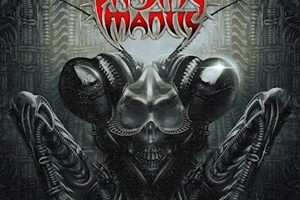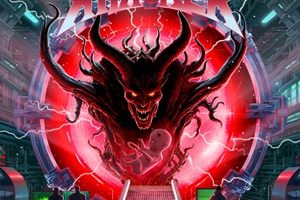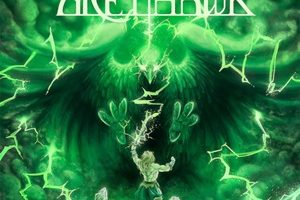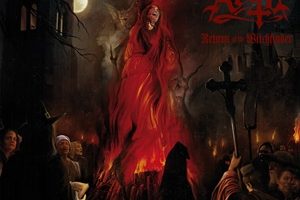Saxon – Hurling Fire and Steel
Tuesday, 23rd January 2024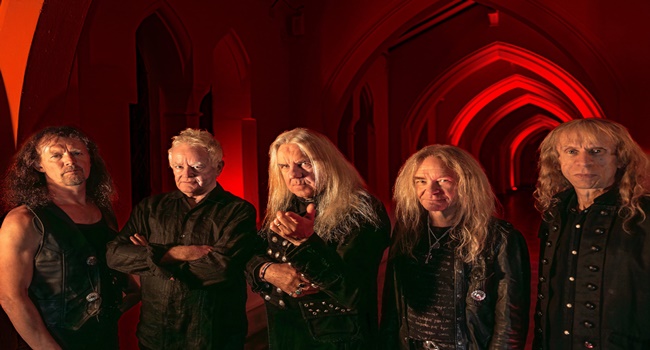
Photo: Ned Wakeman
Veterans of the classic British metal style that elevated this music to a global audience, Saxon continues to produce high quality studio albums even in these modern times. Hell, Fire and Damnation is the latest effort – another stunning ten track platter that keeps the riffs pumping, the tempos rocking, and the vocals in high octane mode. We were able to speak once again to vocalist Biff Byford about the new record, working with co-producer Andy Sneap, how things are with latest guitarist Brian Tatler, upcoming tour hopes with Uriah Heep, what it will take for the younger bands to elevate themselves to bigger arena headline status, a few underrated Saxon albums in the catalog to check out, plus touring plans for the next year.
Dead Rhetoric: Hell, Fire and Damnation is the 24th studio record for Saxon. Where do you see this record sitting in the rich catalog of albums for the group – and how do you remain so energetic as a veteran set of musicians creatively putting out new material consistently in the modern age?
Biff Byford: Well, we love writing songs, that is our biggest motivation, to keep on going. We are always trying to write a better album than the one before, sometimes we do it, sometimes we don’t. I think with this one it’s a pretty special album, I think. There are some good tracks on there. When we have a new album out, we can do a new tour, it all makes sense to tour the world and promote the album. It’s a very old school system, but we like it and it’s good fun.
Dead Rhetoric: You explore many different historical and mystery-oriented topics with the lyrical content for this record. How does the process work in that regard – do you come in with a host of topics at the ready before the music is done, or do you work on a case-by-case basis as the musical ideas develop and churn out the words/melodies based on the emotions or atmosphere that comes about?
Byford: Pretty much, not always, I wait for…. You know I am a musician myself, we spend a lot of time with the boys on the music, arranging, and fine tuning the parts. I have a list of ideas I have, and if the music suits the idea, then I’ll take that one to make a song. That works pretty well with Saxon. The guitar and the music often fit the content of the song. For instance, “Fire and Steel” on the new album, it’s a very fast track, it suits my lyrical and melody ideas.
Dead Rhetoric: Have you always had an interest in exploring historical topics, even as a child?
Byford: Yeah, I love history. I liked history as a child, I was fascinated by the war, as I was born in the 1950’s. There were still a lot of signs of the war around, when I was like six or seven years old, I used to play around the old bomb sites and things. I was fascinated with that historical thing; it was quite fresh in people’s minds. Besides that, when you are seventy years old, you can’t keep writing songs about sex, drugs, and rock and roll. You want to approach topics that are a bit more interesting. I think history is a great thing, and it fits with the metal genre really well.
Dead Rhetoric: Was it a difficult process to figure out which singles to premiere for the new record?
Byford: Not the first one. That’s the title track, “Hell, Fire and Damnation” was the first single. We just released the second one, “There’s Something in Roswell”. We like those two songs, the band. They are not the best songs on the album, but we like those songs, and they work visually as well as musically.
Dead Rhetoric: What do you think about the co-production process, as you worked with famed musician/producer Andy Sneap? What do you like about his work ethic and what he brings to Saxon for the final product?
Byford: He’s very fastidious with the details. It’s great. But I think the album it’s got a great sound and it’s got a great mix. I recorded the rhythm guitars in my studio, and I was able to make sure that everything was played all the way through, no looping or things like that. The rhythm tracks are played all the way through as one piece of music. We gave him a lot of stuff that was very raw and very powerful, and he really got a great sound. He made the album sound hi-fi, and it sounds fantastic.
Dead Rhetoric: Following Paul Quinn’s retirement, you’ve added Diamond Head guitarist Brian Tatler to the band. How are things working out chemistry-wise, and was it important to have a new member who understands the legacy and workings of the band because of his own history in the metal/hard rock scene through the NWOBHM movement?
Byford: I think Paul is a local legend with Saxon fans, Brian is a legend as well – so we replaced one legend with another legend. Chemistry-wise because we come from the same period, he understands the concept of British metal, and he understands Saxon and what makes us different than anyone else, and that’s a great thing. He brings a lot of riffs – he’s a great riff writer. I think it’s a great thing. I co-wrote the title track with him, and I co-wrote “There’s Something in Roswell” with Nibbs the bass player. He adds a really good dynamic to the band.
Dead Rhetoric: Do you have any fond memories of playing with Diamond Head back in those early times?
Byford: I think they did the Donnington Festival with us, Monsters of Rock, back in 1983, I think. That’s probably the first time we played together. We met many times over the years.
Dead Rhetoric: How did the cover come up with Hungarian artist Peter Sallai for the new record?
Byford: I sent out ideas for the concept of the record, images that I wanted. His concept and my idea were fantastic, so I used it. It was as simple as that, really.
Dead Rhetoric: What can you tell us about your expectations for the upcoming North American tour with Uriah Heep – as you’ve always done your best to put together interesting tour packages here and abroad to give all fans value for their money?
Byford: Uriah Heep, they are a great band, and a really big influence on us. I used to go see them before we were really anything. They’ve been making albums a lot longer than we have, their first album I think was back in 1969. They are looked upon as a 70s band really, whereas we are looked upon as an 80s band. Musically, it’s a generational difference. I think it’s a great package for the fans because they can see the legacy of the music being played live.
Dead Rhetoric: You mention in another recent interview with Metal Pilgrim the renewed interest in British metal, which is fueling the work of newer bands like Burning Witches, Enforcer, Night Demon, and so forth into keeping this style alive to younger generations. What factors do you think need to take place for the global scene to possibly see one of these bands make that massive breakthrough to arena-level headlining or higher, top of the bill festival status? As it seems to be much harder to achieve than the old business model pre-internet that you guys grew up on…
Byford: There are quite a few bands that have broken through into that higher level. Shinedown for instance went pretty big, pretty quick. It is possible, you just need a great song that people can connect to, I think. A song of a generation, that’s what they need. They need a song that their fans of their generation can lock onto. Then they’ll be up the bill headlining, high on the bill. We had songs like “Denim and Leather” that were singing about the 80s generation, they seemed to connect. I know it’s hard, but they have to keep trying.
Dead Rhetoric: How does it feel to have Saxon not only appeal to an older generation of fans, but a second and possibly third generation of fans that are still following the music, continuing to buy the records?
Byford: I think we are lucky; our fan base is pretty wide. We have a lot of different people from a lot of different walks of life. There are different age groups as well. We have people that have been with us since 1980, and we have people into us into the 90s, and we will have people that get into us through the new album. It’s great that people are interested, we can still go out and play live, and make new records. With streaming, it’s a lot easier for people to access the music these days. You don’t have to fork out $50 for a vinyl or $16 for a CD, you can stream it for $5 or something. Music these days is really accessible, people just have to want it, that’s the key.
Dead Rhetoric: What is a pivotal or critical moment when looking back at your life that helped shape your musical career?
Byford: I think probably what happened in the early 80s is what shaped us. We became really quite big pretty quickly between 1980 and 1982. I think we have to keep going back to that time, and still try to think about what made people like that music. Because if we capture that essence… we try to think about that with the new album. There are a lot of 80s overtones with the new album.
Dead Rhetoric: Did it seem crazy back then how quickly you were churning out new studio records? Because you were releasing them at a fast pace…
Byford: We probably shouldn’t have released them that quick, but you know, I think our record company thought we were a bit of a flash in the pan. They wanted to get as many records out as they could before we went off and did our thing. 1980 was a big time for Saxon, for Iron Maiden, for Whitesnake, for Motörhead, for Judas Priest. It was a time that British metal music went to the mainstream, really. Played on the radio, tv, and things. We were really surprised, because we never really thought our music would be played on the radio, or live tv – we thought it was too heavy. So many people bought our records back then, the radio and tv had to give the people what they wanted.
Dead Rhetoric: Do you have plans for another solo record down the line – or possibly a third Inspirations installment for Saxon?
Byford: I am thinking of doing another solo record. I’m trying to put some ideas together. I don’t think I’ll be doing much this year with it; I’ll be thinking too much about promoting the new Saxon album and touring live. That’s the main thing for 2024, touring around the world. Nothing planned for a third Saxon Inspirations record – but there are plenty of bands that still inspired and influenced us. There could always be a third one – I’m sure we could make five or six, really. It depends whether people are interested. We’ll keep that one on the backburner.
Dead Rhetoric: When looking at the vast catalog of albums in the Saxon discography, I’m curious to know what one or two albums do you believe are severely underrated that maybe listeners need to spend a bit more time delving into and appreciating that they may not have understood when originally released?
Byford: I think Metalhead is an album that people should have a listen to. It’s very heavy and very dark, we were in our dark period back then. That’s a good album to listen to. There’s some good stuff – Rock the Nations is a great album. I wouldn’t say it’s as British metal as the new album is, but it is worth a listen. I would point people to Metalhead, or Unleash the Beast, that’s another album in America that people haven’t probably heard very much.
Dead Rhetoric: How do you feel about Silver Lining Music as your record label and their staff?
Byford: They are pretty cool. Don’t forget, we are distributed through Warner, they are very cool as well. It’s a good team, I think. It’s always been hard in America to get our music across to everybody, but I think we are probably as popular in America now as we’ve been in quite a long time. Everything is working well, going well, the new tour we will be selling the album, so it will be good.
Dead Rhetoric: What worries or concerns do you have about the world that we are living in now, and where do you think people need to concentrate more to make the world a better place?
Byford: It’s pretty shitty at the moment. I think we are all just living for the day. We have one eye on the news, living our lives is what we do. When it goes so bad that we have to change what we are doing, we are going to have to adapt to a new world. I think the only thing we can do is just carry on.
Dead Rhetoric: What’s left to accomplish in your twilight years on this earth – either within the field of music, or in your own personal world?
Byford: Bucket list, I don’t know. I don’t have a lot left on my bucket list, but I’d like to probably go traveling, just go anywhere nice.
Dead Rhetoric: What’s on the agenda for anything related to Saxon over the coming year or so?
Byford: Lots left. We start touring in March, the UK and Europe with Judas Priest. North America with Uriah Heep after that, then back in the UK again with Judas Priest. We have festivals in the summer, and that’s solid until September. Maybe come back to America for some West Coast shows and Canada, that would be good. We will be busy through the beginning of 2025 as well.













